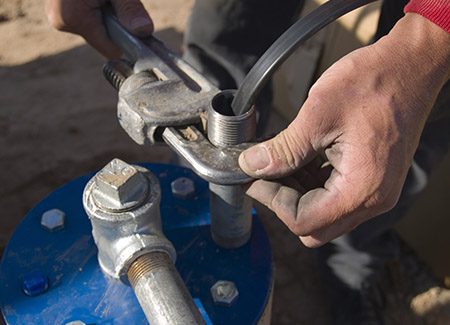Easy Well Pump Replacement: Revitalizing Your Water Framework with Confidence
Easy Well Pump Replacement: Revitalizing Your Water Framework with Confidence
Blog Article
Recognizing the Key Components of Effective Water Filtration Systems

Importance of Water Filtration Systems
Water purification systems play a critical duty in making certain accessibility to safe and clean alcohol consumption water by efficiently getting rid of contaminations and impurities. These systems are vital in dealing with the expanding worries over water quality and the possible health and wellness risks linked with consuming infected water. By using various purification mechanisms such as reverse osmosis, turned on carbon, and UV sterilization, water purification systems can efficiently remove damaging substances like germs, viruses, heavy steels, and chemicals from the water system.
Moreover, water filtering systems help to enhance the preference and odor of water by eliminating chlorine, debris, and various other contaminants that can influence its quality. Water Filtration Systems. This improvement in water quality not only makes it extra palatable however additionally motivates people to consume alcohol a sufficient quantity of water daily, promoting much better hydration and general wellness
Kinds of Filtration Components

Physical filters are developed to physically stress out contaminations from the water. These filters can be made of materials like ceramic, carbon, or perhaps sand, and they function by capturing particles bigger than the filter's pores as water passes via.
Chemical filters utilize various chemical procedures to remove pollutants from the water. Instances include triggered carbon filters, which adsorb pollutants, and turn around osmosis membranes, which utilize pressure to different impurities from the water.
Biological filters use living microorganisms like algae or microorganisms to damage down raw material and pollutants in the water. These filters are commonly made use of in wastewater treatment plants or natural water purification systems.
Understanding the different types of filtering elements is vital for picking one of the most appropriate water purification system for specific filtration requirements.
Feature of Debris Filters
Debris filters play a vital duty in water filtering systems by efficiently recording solid fragments suspended in the water. These filters link are normally the check this initial line of protection in a filtration system, removing larger fragments such as sand, silt, dirt, and rust before the water relocates through finer filtration phases. By capturing these debris, the filters avoid them from getting to downstream parts, therefore expanding the life expectancy and performance of the whole system.
Disregarding this upkeep can lead to clogging, reduced water flow, and endangered filtration effectiveness. Overall, debris filters are indispensable parts that add considerably to the effectiveness of water filtering systems.
Duty of Activated Carbon Filters
Playing a critical duty in water purification systems, triggered carbon filters are important in eliminating contaminations and contaminants from the water supply. As water passes via the filter, the triggered carbon holds and attracts onto the contaminations, guaranteeing that the water that comes out on the other side is cleaner and much safer for usage.
Turned on carbon filters are extremely effective at boosting the taste and odor of water by reducing chemicals that can impact its quality. They are also efficient in removing certain hefty steels like lead and mercury. In addition, these filters can help prevent the accumulation of germs and algae in water, further boosting its general top quality. Because of their adaptability and dependability, triggered carbon filters are a crucial part in making certain that water is purified to the highest possible criteria before reaching consumers.
Recognizing Reverse Osmosis Systems
Reverse osmosis systems are innovative water filtering systems that employ an innovative procedure to get rid of contaminants and impurities from drinking water. These systems function by using stress you can try this out to the water, requiring it through a semi-permeable membrane.
One trick benefit of reverse osmosis systems is their ability to remove a variety of impurities, including heavy steels, dissolved infections, solids, and germs. This makes them highly reliable in enhancing the general top quality and safety and security of drinking water. In addition, reverse osmosis systems are reasonably low-maintenance and can be mounted under the sink or in a main filtering system, supplying hassle-free access to tidy water throughout the family. Overall, understanding how reverse osmosis systems work can aid individuals make educated choices regarding their water filtering requirements.
Final Thought
In verdict, effective water filtering systems are essential for making sure tidy and secure drinking water. By recognizing the feature and function of each part, individuals can make educated decisions when picking a water filtering system.
Water purification systems play a crucial function in guaranteeing access to risk-free and tidy drinking water by properly eliminating impurities and impurities. By using different purification mechanisms such as reverse osmosis, activated carbon, and UV sanitation, water filtration systems can effectively remove dangerous materials like microorganisms, infections, heavy steels, and chemicals from the water supply.
Debris filters play a crucial function in water purification systems by successfully catching strong fragments suspended in the water (Pump repairs & installation).Playing an essential function in water filtration systems, activated carbon filters are critical in getting rid of impurities and contaminants from the water supply.Reverse osmosis systems are innovative water filtration systems that use an advanced procedure to remove contaminants and impurities from alcohol consumption water
Report this page